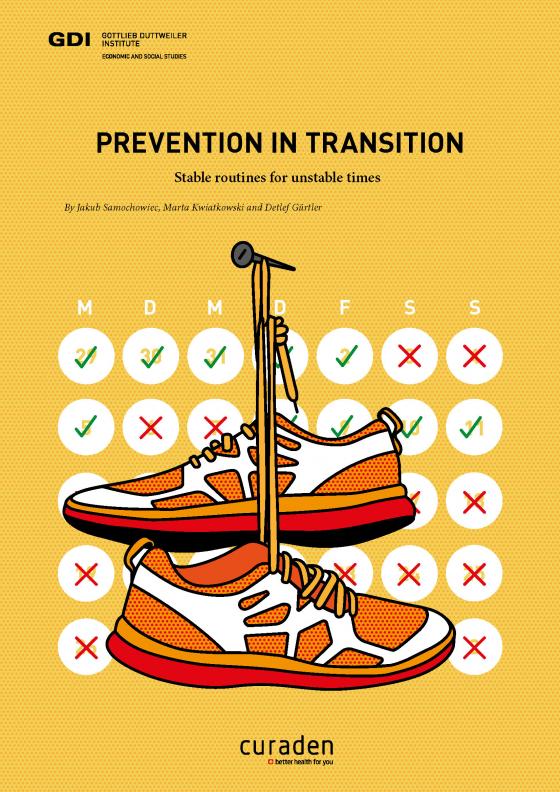
- Verlag: gdi
- Themenbereich: Gesellschaft und Sozialwissenschaften
- Genre: Sachbücher / Politik, Gesellschaft & Wirtschaft
- Ersterscheinung: 29.04.2021
- ISBN: 9783718471294
Prevention in Transition
Stable routines for unstable times
The study includes:
- recommendations to encourage self-regulation
- a prevention scenario for an unstable future
Illness prevention that’s sustainable
Celery smoothie or frozen pizza? Forest run or flopping on the sofa? Netflix or a nap? The coronavirus pandemic has prompted many of us to change our habits, for better or worse. What does it take for us to behave healthier? And how do we prevent illness in a sustainable way? These are the questions addressed in this GDI study.
From smoking to brushing our teeth, our behaviour is often determined by habits we engage in ‘on autopilot’. We can particularly rely on health-promoting habits when our everyday life is stable. During times of upheaval, however, such as changing job, separating from a partner or moving house, our usual context changes and we have to recalibrate our behaviour: health-promoting habits can be lost or new ones can be developed.
The ability to self-regulate and self-reflect is crucial
This is also true in times of global change. The coronavirus crisis has provided an opportunity to observe changes in behaviour, habits and rituals in real time. An evaluation of numerous studies from different countries reveals that many people have, indeed, changed their behaviour during the pandemic, in both healthy and unhealthy ways. In the case of the former, the ability to self-regulate and self-reflect proved decisive in developing healthier behaviour – for example, playing more sport.
On the one hand, these abilities depend on a person’s social integration and economic security. On the other, they can also be learned: and habits can be formed particularly well in times of change. It is now more important than ever, therefore, to engage in prevention activities – and that doesn’t just mean anti-smoking campaigns and prostate screenings.
State or self-control?
Should the state promote health or is it the responsibility of the individual? Are we obliged to behave in a healthy and therefore cost-saving way? And how should incentives in the health system be set?
Such issues are becoming more urgent in the face of rising health costs and need to be negotiated democratically. The GDI study on prevention aims to contribute a new perspective on this debate.
- recommendations to encourage self-regulation
- a prevention scenario for an unstable future
Illness prevention that’s sustainable
Celery smoothie or frozen pizza? Forest run or flopping on the sofa? Netflix or a nap? The coronavirus pandemic has prompted many of us to change our habits, for better or worse. What does it take for us to behave healthier? And how do we prevent illness in a sustainable way? These are the questions addressed in this GDI study.
From smoking to brushing our teeth, our behaviour is often determined by habits we engage in ‘on autopilot’. We can particularly rely on health-promoting habits when our everyday life is stable. During times of upheaval, however, such as changing job, separating from a partner or moving house, our usual context changes and we have to recalibrate our behaviour: health-promoting habits can be lost or new ones can be developed.
The ability to self-regulate and self-reflect is crucial
This is also true in times of global change. The coronavirus crisis has provided an opportunity to observe changes in behaviour, habits and rituals in real time. An evaluation of numerous studies from different countries reveals that many people have, indeed, changed their behaviour during the pandemic, in both healthy and unhealthy ways. In the case of the former, the ability to self-regulate and self-reflect proved decisive in developing healthier behaviour – for example, playing more sport.
On the one hand, these abilities depend on a person’s social integration and economic security. On the other, they can also be learned: and habits can be formed particularly well in times of change. It is now more important than ever, therefore, to engage in prevention activities – and that doesn’t just mean anti-smoking campaigns and prostate screenings.
State or self-control?
Should the state promote health or is it the responsibility of the individual? Are we obliged to behave in a healthy and therefore cost-saving way? And how should incentives in the health system be set?
Such issues are becoming more urgent in the face of rising health costs and need to be negotiated democratically. The GDI study on prevention aims to contribute a new perspective on this debate.
Meinungen aus der Lesejury
Es sind noch keine Einträge vorhanden.
